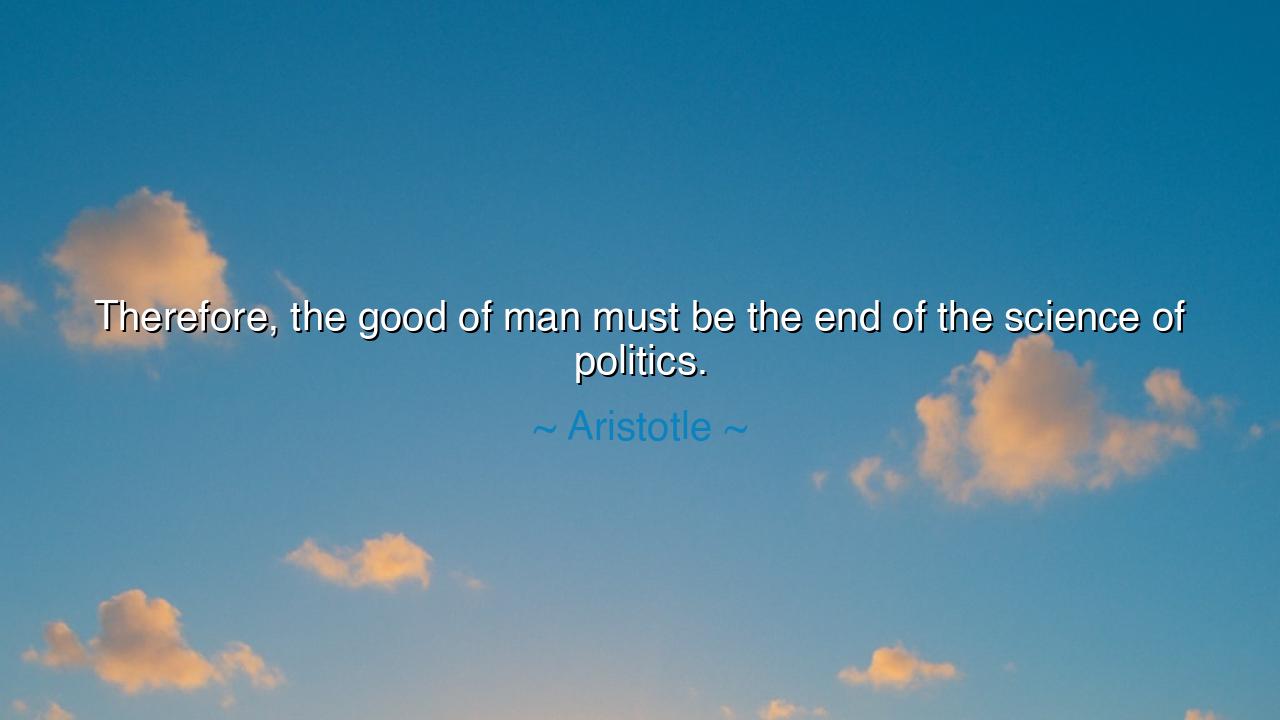
Therefore, the good of man must be the end of the science of






"Therefore, the good of man must be the end of the science of politics." These words, spoken by the great Aristotle, reverberate through time with the weight of wisdom, cutting through the ages to reach our hearts and minds. In this statement, Aristotle encapsulates the very essence of political science—that the ultimate aim of political power and governance is the flourishing of the human soul, the well-being of the individual, and the harmony of the community. It is not the pursuit of power for power’s sake, nor the enforcement of laws for the sake of order alone; it is the cultivation of virtue, the fostering of justice, and the attainment of the highest good that politics must strive for. These truths, though ancient, remain as vital today as they were in the bustling streets of Athens, where Aristotle himself walked and taught.
Let us turn our gaze to the wisdom of the ancients, who understood that the science of politics is not a cold, detached study, but a living art, meant to shape the world and the lives of its citizens. The philosopher-king, as envisioned by Plato, was the ideal ruler—one who not only understood the laws of the state, but also the higher laws of nature and the human soul. Aristotle, in his profound insight, acknowledged that the purpose of governance was not to accumulate wealth, land, or power, but to guide human beings toward their highest purpose—the good of all. To rule with justice, to provide the conditions for flourishing, was the true aim of the political order.
In the land of Athens, where democracy first found its voice, the wisdom of Aristotle was forged in the crucible of civic life. He saw firsthand the challenges of the polis, the city-state, where the passions of the people often clashed with the need for reason and virtue in governance. And yet, despite these challenges, Aristotle remained steadfast in his belief that the good of man must always be the ultimate goal. The laws of the state must be crafted not merely to impose order, but to nurture the moral character of its citizens. For what is a state if not a collective effort to help individuals achieve their highest potential and live in harmony with one another?
Let us consider the life of Pericles, the Athenian statesman, who led his city through the heights of power and influence. His leadership, though marked by grandeur and the splendor of the Athenian empire, was grounded in a vision of civic responsibility and the common good. Pericles understood that the greatness of a city was not measured by its military victories or wealth, but by the freedom, virtue, and justice its people could experience. Under his rule, the Athenians thrived—though, as history would show, even the greatest of leaders could not shield a city from the temptations of power. And so, it is within the flaws of leadership and the shortcomings of statesmanship that we see the great wisdom of Aristotle’s teaching: that the good of the people must always guide the hand of governance, lest the state lose its way.
In our own age, this lesson rings louder than ever. We live in a time where the science of politics has become entangled with the pursuit of self-interest, power, and influence. Political leaders too often focus on the short-term gains of political office, forgetting the higher purpose that must guide them. Whether in the halls of government or in the streets of the marketplace, the question we must always ask is: Does this action, this law, this decision serve the good of man? Does it foster justice, freedom, and the well-being of all people, or does it serve only a few at the expense of the many?
Therefore, the lesson from Aristotle is not merely an ancient philosophical ideal, but a call to action for us today. The work of politics—of governance, of leadership, of shaping society—must be understood as a moral endeavor, one that is rooted in the well-being of all citizens. As we walk through the streets of our modern cities, as we debate policies and laws, we must remember that the ultimate goal is not to gain power or to defeat one’s enemies, but to serve the good of humanity. Every action taken in the name of governance must be guided by this principle of the good, and we, as citizens, must hold our leaders accountable to this sacred task.
In our own lives, then, let us strive to live in such a way that we contribute to the common good—whether through acts of justice, compassion, or virtue. Just as Aristotle urged rulers to seek the good of their people, so too must we seek the good in all our actions. Let us ask ourselves: Does my work, my words, and my deeds serve to uplift others? Am I, in my own small way, contributing to a society of virtue and justice? If we each strive to live by these principles, then the science of politics will not be a distant, theoretical pursuit, but a living, breathing part of our daily lives. And in this, we will shape a world that reflects the highest good of all.






AAdministratorAdministrator
Welcome, honored guests. Please leave a comment, we will respond soon